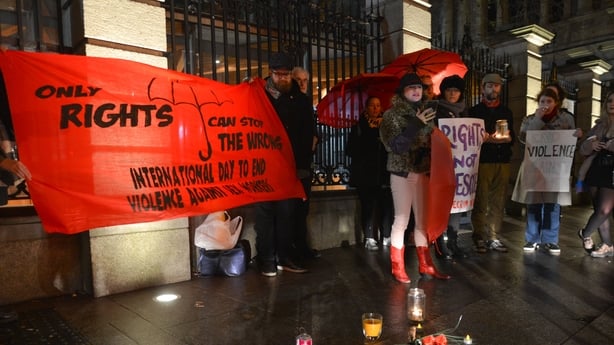The Department of Justice will complete a review of legislation which criminalises payment for sexual activity with a prostitute or a trafficked person.
This has come about due to the absence of an independent expert.
In 2021, solicitor Maura Butler SC was asked to review part 4 of the Criminal Law (Sexual Offences) 2017, however, she was unable to complete it within the three-year timeframe, due to her workload in other areas.
In a parliamentary question to Minister for Justice Helen McEntee, Independent TD Catherine Connolly asked about the status of the review.
Ms Connolly asked for an update on the recruitment process to replace Ms Butler, the timeline for the completion of the review and publication of the final report.
Minister McEntee said that in view of the research already undertaken and the work done in compiling and analysing the submissions received, the most efficient way to complete the review was for the Data and Research Unit in her Department to draft the report using the material provided.
"I believe this approach will ensure the review is completed without any further undue delay and I expect it will be completed by Q3 of this year," she said.
The Sex Workers Alliance Ireland (SWAI) has said the news "would be laughable if it weren't so dangerous".
It has expressed "deep disappointment and frustration" over the Minister's "refusal" to engage with SWAI on the matter, adding that as the primary stakeholders in the review "feel marginalised and unheard".
Director Mardi Kennedy said that when the independent reviewer stepped back recently, SWAI raised concerns that the knowledge gained from the meetings had been lost.
SWAI spokesperson Linda Kavanagh said active sex workers were "the most important voices needed" in the review, and while the terms of reference included sex workers, full engagement had not been attempted.

"Despite numerous requests, SWAI has not received any response regarding the review process, leading us to demand a scrapping and redoing of the review.
"The Minister's ongoing refusal to meet is seen as a disregard for the lived experiences and safety concerns of sex workers under the Nordic model of client criminalisation," she said.
SWAI has questioned whether "ideology" has been prioritised over evidence, research, and the well-being of the community in the process.
It has said that the recent setback in the review process has raised "further concerns" about the Government's commitment to "understanding the impact of the laws" on sex workers' lives.
It has called for transparency, meaningful engagement, and a thorough review process to restore trust and credibility.
"SWAI urges the Government to address the pressing issues faced by sex workers and to prioritise their safety, well-being, and rights by decriminalising sex work in Ireland," a statement said.
In her response to Deputy Connolly, Minister McEntee said it was "generally recognised" that prostitution "is inherently exploitative of vulnerable persons", mainly women and girls, and that many people are forced into prostitution through trafficking, drug addiction, homelessness and poverty.
"A key purpose for the 2017 Sexual Offences Act was to provide additional protection to persons involved in prostitution, especially vulnerable persons and victims of human trafficking.
"It allows those engaged in prostitution to provide information to gardaí, for instance if they were subjected to violence by clients, without fear of prosecution for selling sexual services," she said.
She added that given that the aim of the legislation is to protect vulnerable persons, the review would consider whether further measures were needed to strengthen protection for persons who engage in sexual activity for payment.







